Pedro Diaz, a Ceres High School senior, competed in the 2022 Congressional App Challenge and learned recently that his app creation received third place among entrants from the 10th Congressional District represented last year by Josh Harder.
The Congressional App Challenge is an official initiative of the U.S. House of Representatives, where members of Congress host contests in their districts for middle school and high school students, encouraging them to learn to code and inspiring them to pursue careers in computer science. Each Congress member selects a winning app from their district.
“I was pretty excited about it (but) I was kind of bummed I didn’t get first place,” said Diaz. “I felt like it was a judgmental process but it is what it is. It’s pretty exciting that I even placed because this is the first time I’ve ever done something like that.”
The challenge launched on June 15 and ended on Nov. 1. Diaz was notified on Dec. 2. Ideas for apps were evaluated based on a video participating students had to submit. Diaz developed an app called cyberpass to promote cybersecurity awareness and give users information as to whether or not their information has leaked onto the internet.
“There’s a lot of hackers going around so I decided to make an app that can save your passwords and also you could buy services that look to see if your information has been leaked online,” said Diaz. “I’m launching it on IOS and Android soon. They’ll be able to find it on a regular app store.”
Diaz doesn’t believe there’s anything like it.
“If your data has been breached, I could tell you the steps to take. We’d be able to change the metadata … and from there we could take multiple steps to where we could see who stole your data, where it came from, etc.”
Diaz said he spent about 70 hours developing the app.
“I have like over six years of experience coding. I know multiple languages in coding, JavaScript, TypeScript …”
On campus Diaz is involved in an advanced computer graphics club of which he is president. He heard about the Congressional App Challenge – the most prestigious prize in student computer science – from his teacher Elvis Salgado.
This year’s competition set the record for most student registrations, most apps submitted, most apps per district submitted, and most districts receiving over 20 apps. The wildly successful competition continues to impress upon House Members the importance of computer science education and the need to develop a pipeline of diverse, domestic STEM talent.
In the eight years of the Congressional App Challenge, the program has yielded 2,127 distinct App Challenges across all 50 states.
Diaz aims to attend San Francisco State to pursue a career in computer science and then work for a big industry.
“At some point in my time I want to be able to give back to the community so that people like me, like minorities in computer science, I want to be able to teach them for STEM, give them resources out there.”
He believes that of STEM students, only about seven percent are Latino.





